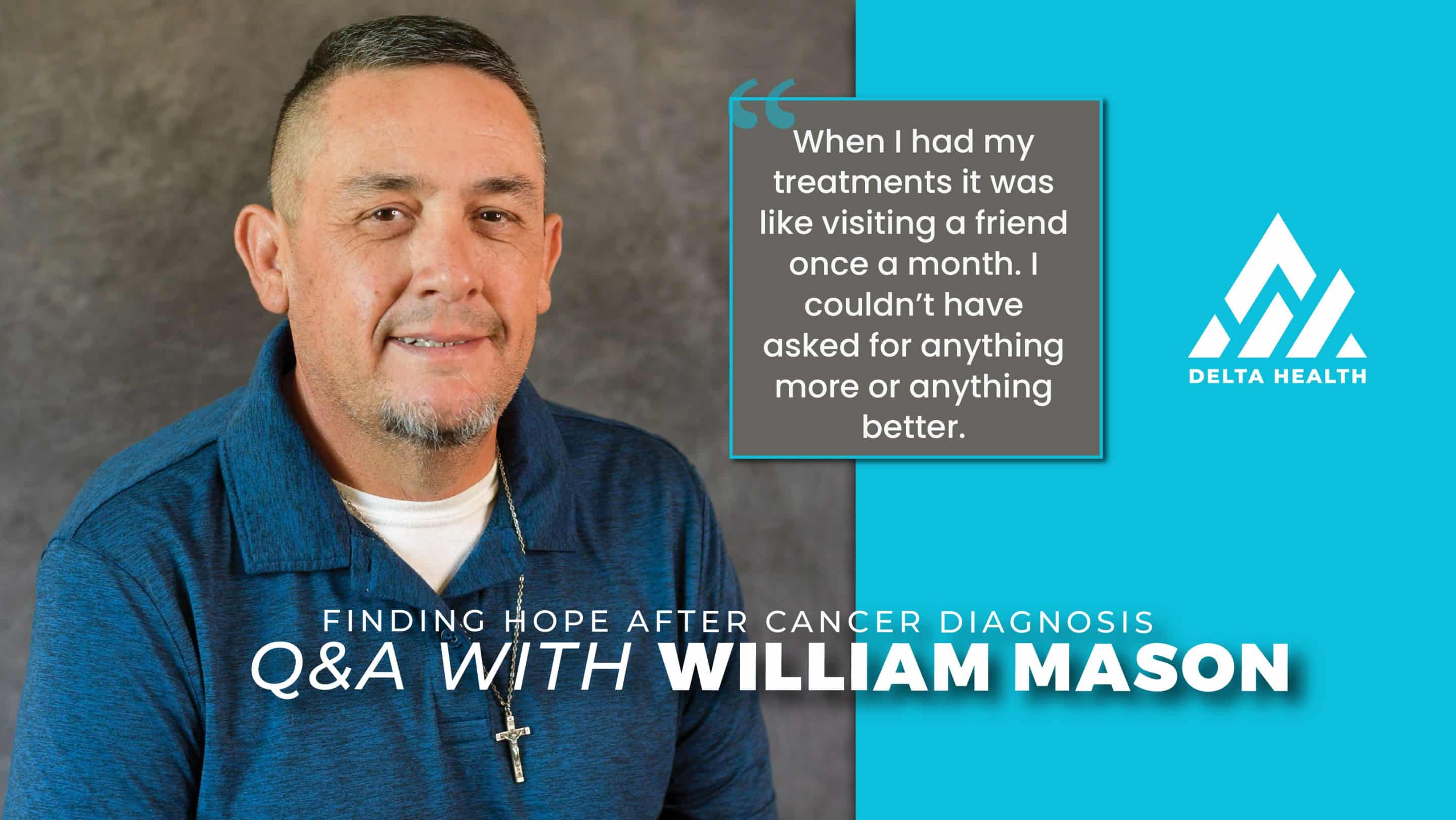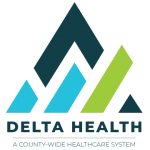In May of 2022, William Mason thought he was coming down with the flu or a bad case of COVID-19. He found himself in bed for a few weeks, unsure why he wasn’t getting better. After encouragement from his wife and sister, he went to the hospital where, along with an irritated pancreas, they found a small golf ball-sized spot on his liver.
When William went three months later for more testing and to check the spot, the scan showed that the spot had grown from the size of a golf ball to a softball. William was diagnosed with stage 4 colon cancer that had spread to his liver.
We sat down with William to talk about his journey with cancer and he shared with us how hope can be found in the darkest of situations.
After your official cancer diagnosis, what did those next few days or weeks look and feel like for you and your family?
William: My wife and I went through the typical of crying for a few days. I was worried about my wife, my son and our finances and how they would get by after I was gone. We had just bought a new house 6 months earlier so I was concerned, and I was angry and I was sad. Stage 4 cancer is a very serious diagnosis.
In those first moments, I told myself you know, ‘this is it, we’re done.’ And I had the mindset of what can I do to make this better for my family, my friends – for everyone. I thought ‘How can I make this transition [of me not being here] comfortable for them?’
I also got really mad, and I broke down and I prayed. I reached out to God and I asked for mercy. The next morning I woke up and I knew that God was with me. All of my worry was gone and my anger was gone, and I had a clear vision of what I was going to do. In just a few days I went from thinking ‘How can I make this better for everyone when I’m gone,’ to ‘I’m not going anywhere.’ I knew that God was 100 percent with me, and that’s what I carried throughout this process. The next step was to figure out how to fight.
How did you come to the decision to receive your cancer treatment at the Delta Health Oncology/Hematology and Infusion Center and how was your experience?
William: I was referred to Dr. Rouch with the Delta Health Oncology/Hematology Clinic. I couldn’t have asked for a better person than my doctor. Dr. Rouch is so alive; her eyes and smile light up a room. There was never a somber tone and there was never a worried tone. She was always encouraging and positive. When I had my treatments it was like visiting a friend once a month. I’d go in there and tell her a corny dad joke and we’d laugh back and forth. I couldn’t have asked for anything more or anything better.
Why did you choose Delta Health for your cancer treatment and not a larger city?
William: When I first got sick my family encouraged me to go to a bigger city for treatment. There’s a town 20 miles away with a new cancer center, and there’s also a big city 50 miles away that has a lot of doctors and nurses – but I live in Delta. The thought of driving 100 miles to get treatment was a big deal for me. A lot of times after treatment you don’t feel great and being only 3 minutes away from my house after my treatments was huge. That’s why I stayed with Delta Health.
What was your experience like at the Delta Health Infusion Center?
William: When it came to the infusion side of my treatment, that whole department is full of my friends. Every single one of them. They never treated me like a number or a subject. They would ask me how I was doing that day and they really wanted to know and were concerned with how I felt on that particular day.
In the infusion department, you don’t always see the same nurse you end up seeing all of the nurses, so I got to know pretty much every single one of them. I know about their families and their kids and where they grew up, and I feel like that’s the difference between a little town like Delta and a big city. At Delta, you’re able to have personal relationships with your team of healthcare providers.
I did have to go to the city to have a piece of liver removed and my colon, and it was not very personal. I couldn’t stand it. I did feel like a number, and I did feel like some of the professionals felt inconvenienced by my illness. Some of them seemed too busy to get to know me as a person – or maybe they didn’t have time to answer all of my questions or to laugh at my old man jokes. So it was great to get to go back to Delta and my team of healthcare professionals here.
What was the treatment plan decided on by you and your healthcare team?
William: For my treatment process I went through 12 rounds of chemotherapy. I had two major surgeries, but I never really suffered. I never really had pain. I didn’t lose my hair, but I did lose some weight.
But I would go to infusion and I know there are a lot of people there who are suffering. Those nurses see very serious cases and you expect that kind of professional to be stressed out, but they never were. It takes a special person to do that kind of work.
How would you describe the care you received at Delta Health?
William: The care that I received was above and beyond what my expectation levels were. I am glad I stayed here in Delta, and I am glad that I was a patient here at Delta Health.
What did your support system look like during your treatment and how did it help you to remain positive?
William: Besides God, my support system included my sister. She’s a registered nurse and was there for almost every chemotherapy treatment. She drove me to my surgeries, and we spent a lot of time together. She did a great job.
My wife was also my support system. We have been together for 18 years and she came through big for me. There were many days I would maybe get off from the cough two times, or other days I would just stare out the window. But my wife waited on me hand and foot and showed me a side I hadn’t seen before. When you spend every single day together for a year and a half you go, oh my gosh there’s this beautiful person inside that I had only ever gotten to see pieces of during our busy lives.
My dad was also there for me and would call me every day or come to see me.
Where are you at today on your recovery journey?
William: I had my surgeries after six of my chemotherapy sessions, and that was at the halfway point. After those six sessions, the tumor on my liver had shrunk from the size of a softball to a baseball. At that point, the doctors decided it was the perfect opportunity to act on that. So I went to Denver and had the surgeries done to remove a piece of liver and my colon. After about 5 weeks of recovery time, we went right back in with chemotherapy.
There are different levels of chemotherapy and different regimens they put you on. Some people go twice per week for two hours, or once a week for 4 hours. My regimen was that I go twice a month for 8 hours each day. One of the nurses told me that out of all the different regimens, mine was one of the most difficult.
At that point, the cancer was pretty much gone from my body, but my doctors felt like it was better to be safe than sorry. They wanted to be proactive even though there was nothing left they could see, they knew there’s more to cancer than what is always visible.
After another 3 months and 6 sessions of chemotherapy, CAT scans and lab work, we came to a place where they said, “OK you’re all done.” All of my labs were great and my numbers were where they should be. When we first started my treatment my tumor marker number was 1270, and today it’s at about 2.5. They let me know that day that my last session would be that coming Tuesday.
At Delta Health, as well as many other cancer centers, one of the traditions is that when a patient completes their treatment, they are given the opportunity to “ring the bell.” This marks the milestone and closes a difficult chapter. When you finished your treatment, you got to ring the bell. Tell us about that experience.
William: The team had cookies for me and we all gathered in the front office where they let me ring the bell; signifying the end of my treatment and cancer journey. I gave a speech and I thanked every one of them individually. I would have never gotten through this without them.
Part of my message that day was that I wasn’t just ringing the bell for me, it was for all of the people who were still in treatment and suffering. I probably rang the bell harder than anyone else ever has, but I hope that everyone throughout the Infusion Center knew that I was ringing it for them. I wanted them to say to themselves that one of us got out of here, and if one of us can do it then I can go home, too.
—–
The Delta Health Oncology/Hematology Clinic and Infusion Center provides exceptional cancer care that takes a holistic approach and focuses on the physical, mental and emotional aspects of each patient. To learn more, visit deltahealthco.org or call 970.399.2895.



